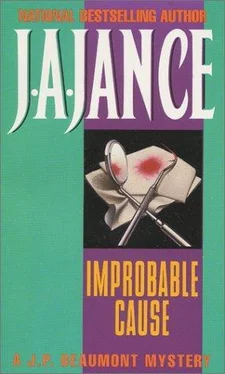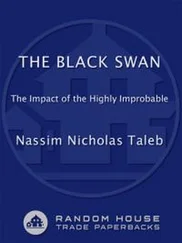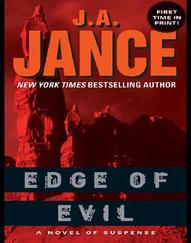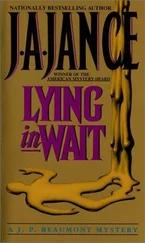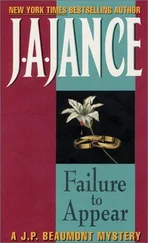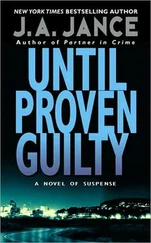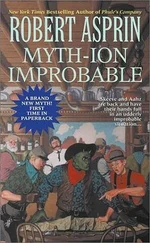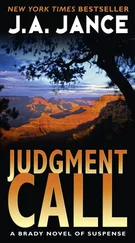J. Jance - Improbable cause
Здесь есть возможность читать онлайн «J. Jance - Improbable cause» весь текст электронной книги совершенно бесплатно (целиком полную версию без сокращений). В некоторых случаях можно слушать аудио, скачать через торрент в формате fb2 и присутствует краткое содержание. Жанр: Триллер, на английском языке. Описание произведения, (предисловие) а так же отзывы посетителей доступны на портале библиотеки ЛибКат.
- Название:Improbable cause
- Автор:
- Жанр:
- Год:неизвестен
- ISBN:нет данных
- Рейтинг книги:3 / 5. Голосов: 1
-
Избранное:Добавить в избранное
- Отзывы:
-
Ваша оценка:
- 60
- 1
- 2
- 3
- 4
- 5
Improbable cause: краткое содержание, описание и аннотация
Предлагаем к чтению аннотацию, описание, краткое содержание или предисловие (зависит от того, что написал сам автор книги «Improbable cause»). Если вы не нашли необходимую информацию о книге — напишите в комментариях, мы постараемся отыскать её.
Improbable cause — читать онлайн бесплатно полную книгу (весь текст) целиком
Ниже представлен текст книги, разбитый по страницам. Система сохранения места последней прочитанной страницы, позволяет с удобством читать онлайн бесплатно книгу «Improbable cause», без необходимости каждый раз заново искать на чём Вы остановились. Поставьте закладку, и сможете в любой момент перейти на страницу, на которой закончили чтение.
Интервал:
Закладка:
That didn’t surprise me. Like Rachel, I was still convinced that Daisy was somewhere on the grounds, but unlike Rachel, I didn’t have a good feeling about it.
“Is there any animal here that’s a particular favorite of hers?” I asked.
Rachel puzzled that one for a moment or two. “Daisy likes the giraffes,” she answered. “The giraffes and the elephants both.”
We had already visited both compounds several times, but what we had done so far wasn’t working. “Tell you what,” I said. “You’ve been walking all afternoon. Would you like to catch up with Al and have him give you a ride home?”
She stood there looking up at me for several moments, her eyes searching my face.
“What’s going to happen to Daisy when we find her, Detective Beaumont? Will she have to go to prison?”
“I don’t know, Rachel,” I said, shaking my head. “Sorry. That’s up to the courts. I’m a detective, not a judge. But she’ll be a hell of a lot better off if you and I find her first, before the department issues an All Points Bulletin.”
I let Rachel think that one over. Now that it was just the two of us searching, there was a fifty-fifty chance that she would be the one to find her. If that happened, if Rachel found Daisy first when I wasn’t around, there was a good possibility she’d warn her, let her get away. Maybe that’s really what I wanted. Maybe deep in the bottom of my subconscious that’s what I hoped would happen.
Rachel Miller met my gaze without blinking or looking away. “What do you want me to do?” she asked simply. She was in for the duration and so was I.
“You go to the savanna and look for her there. I’ll hang around the elephants. If you see her, come get me right away, understand?”
“All right,” Rachel said. She hurried away.
Once she was gone, I straightened my shoulders and pulled in my gut. My feet hurt, too.
I was just too damn stubborn to admit it.
CHAPTER 23
I love stakeouts in the movies. They usually happen on fashionable streets, preferably ones with sidewalk cafes and lots of beautiful women. The hero sits comfortably at a table, casually pretending to read a newspaper and looking unobtrusive. Invisible, even. If no sidewalk cafe happens to be in the script, the hero still reads a newspaper, leaning against a nearby building.
This is unobtrusive? When’s the last time you leaned against a building to read a newspaper?
The logistics of my finding Daisy Carmichael in the Woodland Park Zoo were a little more complicated than a Hollywood version of a stakeout. For one thing, we both knew each other on sight. If I recognized her, she would recognize me.
And was it better for me to stand in one place in hopes she would wander past, or should I mingle on the outskirts of the groups gathering for the Jungle Party? In the end, I did a combination of both.
I developed a pattern. After making a slow circle around the elephant enclosure and passing the prairie dog compound, I’d saunter over to the north meadow, past the pony rides, and into the tents. Booze flowed freely at the party. Everybody knows that tipsy auction attendees spend way more money than cold sober ones do. I’d make one pass through each of the tents, then wander back to the elephant enclosure again.
It was boring, lonesome, tedious work, especially since all those other people seemed to be having such a good time.
Not only that, I don’t like zoos. Never have. Walking around and around it by myself that night did nothing to change my opinion.
When the kids were little, Karen thought taking Kelly and Scott to the zoo on a Saturday afternoon should have been top on my list of favorite fatherly pastimes. Except standing on one side of a set of iron bars looking at someone or something on the other side isn’t my idea of a diversion. It reminds me too much of my job.
And zoos make me claustrophobic. They are built like mazes with no panoramic viewpoints where you can see from one end to the other. They’re designed so each little piece of habitat is separated from all the others by a discreet hedge or a wall of trees or a curtain of bamboo shoots. It may be good for the animals’ sense of privacy, but it sure as hell doesn’t help when you’re a police officer looking for a lady who isn’t especially interested in being found.
By seven the rain had finally stopped, but the air was still moist and heavy, as though Mother Nature wasn’t quite through with us yet. For probably the tenth time, I walked around to the back side of the elephant compound where a docent, not Daisy Carmichael, was giving a talk on elephants to a group of wide-eyed children.
They gasped and pointed with delight as one by one, four elephants came out of the barn into the moat-encircled compound. Two of the four were fully grown while the other two were obviously much younger. The smaller ones bounded into a round, elephant-sized swimming pool, playing and floating there briefly, while excess water splashed over the edges in foot-high waves.
One of the children broke away from the group and went scrambling toward the concrete fence. “I want to pet Dumbo,” he called over his shoulder. “Here, Dumbo. Here, Dumbo.”
The docent grabbed the kid by one arm and hauled him off the fence. “You mustn’t do that! Ever! Elephants are very, very dangerous. This exhibit is their home. They don’t like strangers coming into it.”
“Dumbo wouldn’t hurt me,” the kid insisted tearfully. “I know he wouldn’t. Anyway, if he tried to, I’d run.”
“Elephants can run lots faster than people can,” the docent explained.
“Even faster than grown-ups?” the little kid asked wonderingly.
“Faster than grown-ups,” the docent replied, nodding.
Grasping the recalcitrant youngster by the hand, she led the group away, announcing firmly that it was time to go see the ponies.
“Way to go!” I said to her as she walked past me. “You handled that like a champ.”
She smiled her thanks and kept on going, still holding tightly to the little boy’s hand.
Time passed-how long, I’m not sure. Off and on I heard a distant rumble of thunder, a promise of more rain to come. Rain is common in Seattle. Thunder and lightning aren’t. The elephants responded to each rumble by raising their heads, flapping their ears, and swinging their gigantic trunks from side to side. The biggest one, an African elephant, stood a good ten feet high and must have weighed nine thousand pounds. She ruled the roost in that compound. The younger ones, once they came out of the pool, were careful to stay at a respectful distance.
They moved with a peculiar, ponderous grace, the weight of their bodies landing on their toes as they walked. The smell of their bodies in the damp air was sharp and pungent.
Several groups of well-dressed visitors came through and were invited inside the glassed-in part of the elephant enclosure. Painted on the concrete floor inside was a yellow line marked danger. The visitors were careful to stand well back behind the yellow line with their backs to the windows while the handlers stood in what seemed to be nonchalant poses with their backs to their charges. Careful examination, however, revealed metal-and-wood elephant hooks tucked under the keepers’ arms.
Each time a group came into the barn, the elephants would come in from outside, too, as if on command. It didn’t take a Philadelphia lawyer to figure out why. At the end of each lecture, the keepers allowed the visitors to hand out carrots, passing them one at a time to the four eager, outstretched trunks that reached through the bars.
It was getting later, but still there was no sign of Daisy. And the smell of the food from the caterer’s trucks was tantalizing. I hadn’t eaten all day. On my next pass through the party area, I stopped at the door of the large tent where a sweet young thing in a bright blue dress was collecting invitations and marking off names on a sheet of paper. I waited in line to talk with her.
Читать дальшеИнтервал:
Закладка:
Похожие книги на «Improbable cause»
Представляем Вашему вниманию похожие книги на «Improbable cause» списком для выбора. Мы отобрали схожую по названию и смыслу литературу в надежде предоставить читателям больше вариантов отыскать новые, интересные, ещё непрочитанные произведения.
Обсуждение, отзывы о книге «Improbable cause» и просто собственные мнения читателей. Оставьте ваши комментарии, напишите, что Вы думаете о произведении, его смысле или главных героях. Укажите что конкретно понравилось, а что нет, и почему Вы так считаете.
